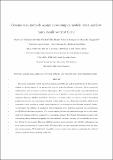Genome scan methods against more complex models : when and how much should we trust them?
Abstract
The recent availability of next-generation sequencing (NGS) has made possible the use of dense genetic markers to identify regions of the genome that may be under the influence of selection. Several statistical methods have been developed recently for this purpose. Here, we present the results of an individual-based simulation study investigating the power and error rate of popular or recent genome scan methods: linear regression, Bayescan, BayEnv and LFMM. Contrary to previous studies, we focus on complex, hierarchical population structure and on polygenic selection. Additionally, we use a false discovery rate (FDR)-based framework, which provides an unified testing framework across frequentist and Bayesian methods. Finally, we investigate the influence of population allele frequencies versus individual genotype data specification for LFMM and the linear regression. The relative ranking between the methods is impacted by the consideration of polygenic selection, compared to a monogenic scenario. For strongly hierarchical scenarios with confounding effects between demography and environmental variables, the power of the methods can be very low. Except for one scenario, Bayescan exhibited moderate power and error rate. BayEnv performance was good under nonhierarchical scenarios, while LFMM provided the best compromise between power and error rate across scenarios. We found that it is possible to greatly reduce error rates by considering the results of all three methods when identifying outlier loci.
Citation
de Villemereuil , P , Frichot , E , Bazin , E , Francois , O & Gaggiotti , O E 2014 , ' Genome scan methods against more complex models : when and how much should we trust them? ' , Molecular Ecology , vol. 23 , no. 8 , pp. 2006-2019 . https://doi.org/10.1111/mec.12705
Publication
Molecular Ecology
Status
Peer reviewed
ISSN
0962-1083Type
Journal article
Description
PdV was supported by a doctoral studentship from the French Ministiere de la Recherche et de l'Enseignement Supierieur. OEG was supported by French ANR grant No 09 GENM 017 001 and by the Marine Alliance for Science and Technology for Scotland (MASTS). EF and OF were supported by a grant from la Region Rhone-Alpes. OF was further supported by Grenoble INP.Collections
Items in the St Andrews Research Repository are protected by copyright, with all rights reserved, unless otherwise indicated.

